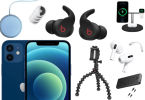In today’s digital age, our smartphones have become an integral part of our lives, storing a wealth of personal and sensitive information. With the increasing reliance on smartphones for communication, banking, shopping, and more, ensuring the security of your iPhone is paramount.
- Keep Your iOS Up to Date: Apple regularly releases updates to iOS, the operating system that powers the iPhone. These updates often include security patches that address vulnerabilities and protect your device from potential threats. To ensure your iPhone is secure, it’s essential to keep your iOS up to date by regularly checking for and installing updates.
- Enable Find My iPhone: Find My iPhone is a feature built into iOS that allows you to locate, lock, and erase your device remotely in case it is lost or stolen. By enabling Find My iPhone, you can take proactive steps to protect your data in the event of a security breach.
- Use Strong, Unique Passwords: Passwords are the first line of defense against unauthorized access to your device and accounts. Ensure your iPhone is protected by using strong, unique passwords for your device and any accounts linked to it. Consider using a password manager to generate and store complex passwords securely.
- Enable Two-Factor Authentication (2FA): Two-factor authentication adds an extra layer of security by requiring a second form of verification, such as a code sent to your phone, in addition to your password. Enable 2FA for your Apple ID and any other accounts linked to your iPhone for enhanced security.
- Be Cautious of Phishing Attempts: Phishing is a common tactic used by cybercriminals to trick users into providing sensitive information. Be wary of unsolicited emails, messages, or links that ask for personal or financial information. When in doubt, verify the legitimacy of the request with the sender before providing any information.
- Use a VPN on Public Wi-Fi: Public Wi-Fi networks are often insecure, making it easy for hackers to intercept your data. Protect your iPhone by using a reputable VPN (Virtual Private Network) when connected to public Wi-Fi networks to encrypt your internet traffic and keep your data secure.
- Review App Permissions: Review the permissions granted to apps on your iPhone to ensure they are necessary and appropriate. Disable permissions that are not essential for the app to function to reduce the risk of unauthorized access to your data.
- Enable Automatic App Updates: Keeping your apps up to date is crucial for security, as developers often release updates to patch vulnerabilities. Enable automatic app updates on your iPhone to ensure you are always running the latest, most secure versions of your apps.
- Use Touch ID or Face ID: Take advantage of the biometric authentication features offered by your iPhone, such as Touch ID or Face ID, to add an extra layer of security to your device. These features make it more difficult for unauthorized users to access your device.
- Enable Restrictions: iOS offers a range of restrictions that allow you to control access to certain features and content on your iPhone. Enable restrictions to prevent unauthorized changes to settings and limit access to sensitive data.
In conclusion, protecting your iPhone from security threats requires a combination of awareness, vigilance, and proactive measures. By following the tips outlined in this article, you can enhance the security of your iPhone and safeguard your personal information.







